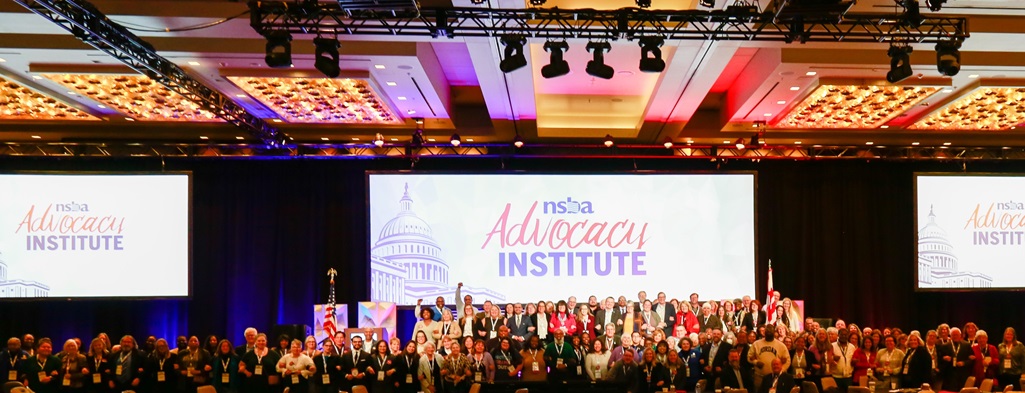Nearly 1,000 attendees representing 42 states, the District of Columbia, Canada, and the Virgin Islands convened in Washington, D.C., for NSBA’s Equity Symposium (Jan. 27) and Advocacy Institute (Jan. 28-30).
The Equity Symposium opened with NSBA Executive Director and CEO Verjeana McCotter-Jacobs stressing the connection between equity and advocacy. “These are both actions,” she said. “Over the last few years, this conversation has really been under attack and ‘equity’ has been tantamount to a four-letter word. But when people push back on supporting each and every child, it's our job and our responsibility to make sure they understand that each and every child means all children in this country.”
Later in the day, performer and mental health advocate Alex Boyé told attendees to get rid of the “mental trash” clogging their minds and think of themselves as a “10.” “For every single one of you here, you’ve got the kids, but who's got you?” he asked attendees. “If your cup is empty, how are you going to fill kids’ cups?”
Additional speakers included Julieanna L. Richardson, founder and executive director of The HistoryMakers, and representatives from NSBA’s Equity Councils who shared their personal journeys and inspirational stories to highlight the importance of equitable outcomes for each student in our communities.
At the Advocacy Institute, NSBA President Kristi Swett encouraged attendees to not just come to Washington, D.C. to advocate for federal dollars and support, but to meet elected officials “on their home ground” in their districts and invite them into their schools. “Your superpower is that you have stories, real-life stories about your kids that you can share with them,” she said. “That’s what they’re going to remember.”
Kymyona Burk, senior policy fellow in early literacy for the Foundation for Excellence in Education, explained the “Mississippi Miracle” and how Mississippi went from being ranked the second-worst state in 2013 for fourth-grade reading to twenty-first in 2022 by focusing on educator training; coaching for teaching; early identification; prevention over retention; individual reading plans; and parent communication.
Dr. Temple Grandin, a world-renowned researcher, humane livestock scientist, and autism awareness spokesperson, discussed different kinds of thinkers and the different approaches necessary to help them succeed. Gian Paul Gonzalez, founder and director of Hope + Future, Inc., and the man who inspired the New York Giants “All In” run to victory in Super Bowl XLVI, reminded attendees that “fame is what individuals did for themselves, but greatness is what they did for others.”
Lucas Held, former vice president for communications for the Wallace Foundation, reviewed the history of polarization in public education and offered strategies school districts can take to help depolarize conflictual situations. Tami Pyfer, chief of staff for UNITE and the co-creator of the Dignity Index, offered ways to ease divisions, prevent violence, and solve problems by highlighting the use of dignity vs. contempt in public and political speech.
Attendees also heard from U.S. Deputy Secretary of Education Cindy Marten; U.S. Senators Bill Cassidy (R-LA) and Chris Van Hollen (D-MD); and U.S. Representatives Bobby Scott (D-VA) and Jared Huffman (D-CA) about special education, school nutrition, federal education funding, and more.


Share this content